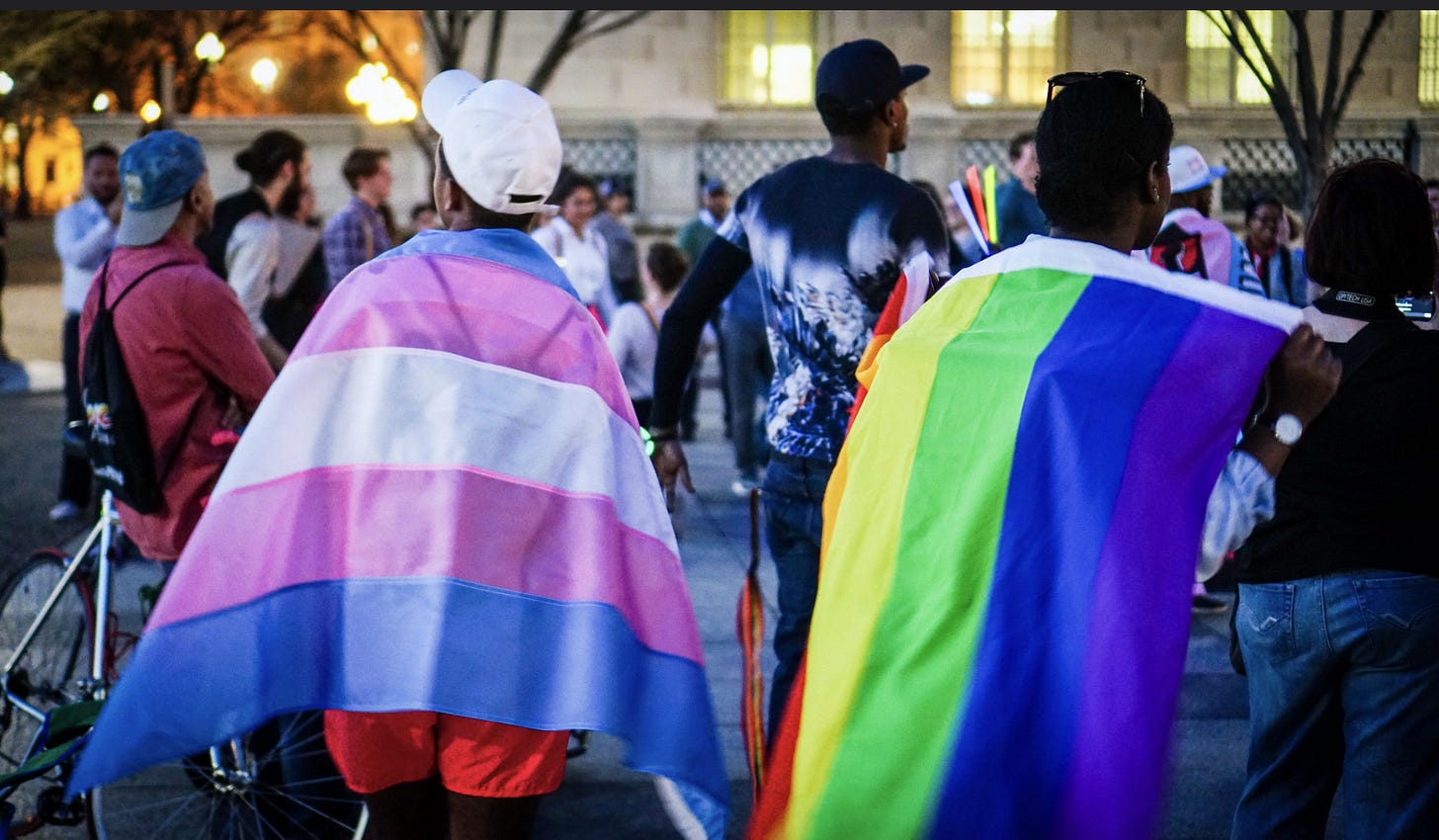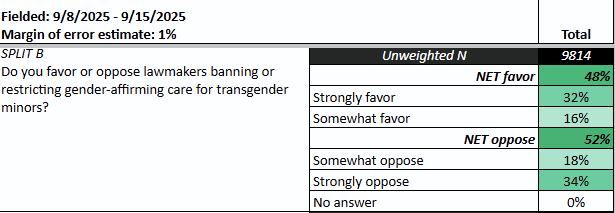New Poll: Most Americans Oppose Bans On Gender Affirming Care For Trans Youth
A new The 19th/SurveyMonkey poll reveals that most Americans oppose bans on trans care for youth, with LGBTQ+ people overwhelmingly opposing such bans.
In Trump’s second term, transgender people have faced one of the most relentless assaults in modern history. Passports have been restricted and delayed, hospitals threatened by the government and programs shuttered for providing care, and even the word “transgender” has been scrubbed from the Stonewall National Monument—an erasure of the very history we helped shape. Against that backdrop, a new The 19th/SurveyMonkey poll offers the first major read on public sentiment around trans healthcare in recent months—and it shows Americans opposing bans on gender-affirming care.
When asked whether lawmakers should ban or restrict gender-affirming care for transgender minors, 52 percent of Americans said they oppose such laws, while 48 percent said they favor them. The largest share—34 percent—“strongly oppose.” The result tracks with other surveys, including a March 2025 Data for Progress poll that found broad resistance to government bans on gender-related care for trans youth.
The poll also broke down support by subgroup. Black Americans were more likely to oppose bans on trans youth care, with 55 percent opposed and 45 percent in favor. Women opposed bans at higher rates than men, 56 percent to 48 percent. By age, Generation X was the only age group in favor of trans youth care bans, while younger and older cohorts were either evenly split or leaned toward opposition to such bans.
Perhaps most telling for the political landscape, independents opposed bans on trans youth care by 54 percent. Democrats were overwhelmingly opposed, with 67 percent against. Republicans, by contrast, favored bans by 64 percent. The finding undercuts a familiar line from “centrist” strategists who insist Democrats should retreat on transgender rights. On healthcare at least, the stronger play with independents appears to be standing against bans.
One subgroup stood out for its overwhelming consistency: LGBTQ+ people. Seventy-two percent supported establishing a right to gender-affirming care for trans youth, while also opposing bans. The finding directly contradicts claims that the LGBTQ+ community is retreating from support for transgender rights.
Some caution is warranted in reading the numbers. While most Americans opposed outright bans, they also rejected establishing a legal “right” to gender-affirming care for youth. That doesn’t mean they favor restrictions—rather, they see the decision as one for parents, families, doctors, and the young people themselves, a pattern confirmed in other surveys. And across partisan lines, voters share deep skepticism about lawmakers’ role: 64 percent, including a majority of Republicans, said politicians don’t know enough about transgender care to be writing laws on it.
In recent months, the Trump administration has dramatically escalated its crackdown on transgender healthcare. Roughly half of hospitals across the country—including many in blue states—have stopped offering gender-affirming care under the weight of funding threats and investigatory demands from Washington. Some institutions have pushed back and won. Boston Children’s Hospital, for example, successfully fought off the administration in court when it tried to strong-arm the hospital into handing over patient records related to trans youth care.
Gender-affirming care saves lives. A Cornell review of more than 51 studies found that such care significantly improves the mental health of transgender people. One major study reported a 73 percent drop in suicidality among trans youth who began treatment; another found a 40 percent reduction in actual suicide attempts in the previous year. Research published in the Journal of Adolescent Health in April 2024 showed puberty blockers sharply reduced depression and anxiety. Abroad, a German review backed by 27 medical organizations endorsed gender-affirming care for youth, and a recent French medical consensus did the same. The evidence has driven a historic resolution from the American Psychological Association—representing 157,000 members—formally condemning bans on trans care.
No federal law currently bans gender-affirming care for trans youth, but Republicans—led by Trump—have made dismantling it a central policy goal. In the latest shutdown fight, the administration walked away from negotiations after claiming Democrats demanded anti-trans riders be stripped from the budget. Those provisions would devastate care nationwide, imposing a federal funding ban that would wipe out Medicaid, Medicare, and TRICARE coverage and threaten hospitals that provide treatment. Americans may oppose such bans and doubt that politicians are equipped to write healthcare policy. But Trump’s administration is pressing ahead anyway—dictating care bans, backed not by science, but by ideology.




Going out on a limb, those who oppose political medical bans for one , likely feel the same for all people. We must retain self governance of our own minds and bodies.
I’d add those who support political medical bans, should rethink what it is that brings them pleasure playing god in other people’s lives.
I will be waiting with baited breath to see if our Democratic leaders will stand up for the transgender population or cave. I have very little faith in the moment.